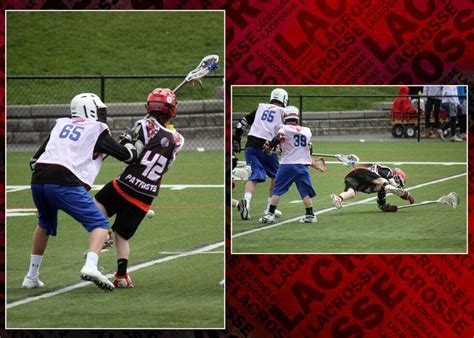Explore mental toughness in lacrosse, key techniques for athletes, visualization’s impact, resilience building, and successful training outcomes in this comprehensive guide.The Psychology Of Lacrosse: Mental Toughness Training
In the fast-paced, dynamic world of lacrosse, exceptional physical skills alone aren’t enough to secure victory; mental toughness is paramount. This article delves into the intricate psychology behind mental toughness training in lacrosse, illuminating the critical role it plays in enhancing athletic performance. Through understanding the psychological factors that contribute to resilience and focus, athletes can equip themselves with key techniques to fortify their minds as well as their bodies. From visualization strategies to overcoming adversity, we explore how developing mental fortitude can transform both individual players and teams. Join us as we uncover the secrets to measuring success through the lens of mental toughness, ensuring that every athlete is prepared to face the challenges of the game head-on.
Understanding The Psychology Behind Mental Toughness In Lacrosse
The foundation of mental toughness in lacrosse rests on a deep understanding of The Psychology that informs athletes’ behavior and performance under pressure. Mental toughness is not merely about being tough; it encapsulates focus, resilience, emotional control, and the ability to handle stress and setbacks effectively. In the fast-paced environment of a lacrosse game, where decisions must be made quickly and under pressure, psychological preparedness is crucial.
To develop a robust framework for mental toughness, athletes must first recognize the importance of a growth mindset. This mindset encourages players to embrace challenges, learn from failures, and persist in the face of difficulties. Coaches and athletes alike should foster an environment where mistakes are viewed as opportunities for growth rather than setbacks. This shift in perspective can significantly influence performance on the field.
Moreover, the concept of self-efficacy—an individual’s belief in their capability to succeed—is fundamental in the context of lacrosse. When players believe in their skills and abilities, they are more likely to approach high-pressure situations with confidence and calm. Setting specific, attainable goals can bolster self-efficacy, enabling athletes to track their progress and celebrate small victories along their journey.
Another critical element of the psychological landscape in lacrosse is emotional regulation. Athletes often experience intense emotions during games, ranging from excitement and joy to frustration and fear. Developing techniques to manage these emotions can greatly enhance performance. Practices such as mindfulness and controlled breathing can help athletes maintain composure, allowing them to stay focused on the game rather than becoming overwhelmed by stressors.
Understanding The Psychology of mental toughness in lacrosse involves a blend of mindset shifts, goal setting, and emotional management. By incorporating these psychological principles, players can not only enhance their performance but also enjoy a more fulfilling and resilient sporting experience.
Key Techniques For Developing Mental Toughness In Athletes
Developing mental toughness is essential for lacrosse players aiming to excel in a highly competitive environment. Here are some effective techniques to enhance this crucial aspect of The Psychology of sports performance:
- Goal Setting: Establish clear, measurable, and attainable goals. By breaking down long-term objectives into short-term milestones, athletes can maintain focus and motivation.
- Positive Self-Talk: Encourage athletes to engage in positive affirmation practices to boost their confidence. Replacing negative thoughts with constructive and optimistic ones can help in overcoming self-doubt during critical game moments.
- Mindfulness and Meditation: Incorporating mindfulness practices allows players to maintain presence and avoid distraction. Techniques such as deep breathing and meditation can help reduce anxiety, keeping athletes calm under pressure.
- Controlled Exposure to Pressure: Create practice scenarios that mimic high-pressure situations. By repeatedly facing challenges in a controlled environment, athletes can build their ability to perform when it truly matters.
- Reflection and Journaling: Encourage athletes to keep a journal of their experiences, thoughts, and feelings about their performance. Reflecting on successes and areas for improvement can foster a growth mindset essential in The Psychology of athletic development.
- Visualization Techniques: As mentioned in a earlier section, visualization is a powerful method for developing mental toughness. Athletes should regularly practice visualizing themselves succeeding in different game scenarios, enhancing their confidence and mental preparedness.
Combining these techniques can significantly contribute to an athlete’s mental toughness, positioning them for success on and off the field. By understanding The Psychology behind these strategies, athletes can empower themselves and achieve their athletic goals.
The Role Of Visualization In Lacrosse Performance Psychology
Visualization is a powerful psychological tool widely utilized in sports, including lacrosse. It involves creating mental images of successful performances, which can enhance an athlete’s confidence and focus. In The Psychology of mental toughness, visualization acts as a cornerstone technique for mental preparation and resilience.
Studies have shown that mental imagery can significantly impact an athlete’s ability to execute skills under pressure. Through visualization, lacrosse players can rehearse game scenarios, visualize successful plays, and manage stress effectively. This practice not only prepares them for competitive environments but also helps build a positive mindset that can counteract anxiety and fear of failure.
Incorporating visualization into training routines involves a few key steps:
- Setting a clear goal: Athletes should begin with a specific performance objective they want to achieve during games.
- Imagining the scenario: Players should close their eyes and vividly picture themselves in a game situation, executing skills flawlessly.
- Engaging all senses: To maximize the effectiveness, athletes need to engage all their senses — visualizing the sights, sounds, and even feelings related to the game’s atmosphere.
- Regular practice: Like any other skill, visualization requires consistent practice to refine and strengthen mental imagery capabilities.
By regularly implementing visualization techniques, lacrosse athletes can enhance their mental preparedness, leading to improved performance. This illustrates how integrating The Psychology of mental toughness training with practical strategies can yield significant benefits in athletic performance.
Building Resilience: The Psychology Of Overcoming Adversity In Lacrosse
Resilience is a crucial trait for athletes in any sport, but it holds particular significance in lacrosse, where physical and mental challenges abound. The ability to bounce back from setbacks, injuries, or performance slumps can define a player’s career and their enjoyment of the game. In this segment, we explore the psychology of building resilience and how it can be effectively nurtured in lacrosse athletes.
Understanding that setbacks are part of the journey is vital for developing resilience. Many athletes face injuries or periods of poor performance, which can be disheartening. Recognizing these moments as opportunities for growth can shift a player’s mindset. Psychologists suggest that reframing challenges as learning experiences helps maintain motivation and fosters a more robust mental framework.
Key Components of Resilience in Lacrosse
| Component | Description |
|---|---|
| Self-Awareness | Understanding one’s own emotions and reactions during pressure situations. |
| Goal Setting | Establishing realistic and achievable goals to maintain motivation. |
| Social Support | Building a strong network of teammates, coaches, and family for encouragement. |
| Positive Mindset | Fostering an optimistic outlook to navigate through challenges. |
Practicing mental toughness through resilience training can involve various strategies. One effective method is embracing a growth mindset, which encourages athletes to view failures as opportunities for improvement rather than insurmountable obstacles. Techniques such as journaling about challenges faced during practice or games, and how they were overcome can help strengthen this mindset.
Moreover, inclusion of team-building activities can enhance social bonds among players, fostering a culture of support and collective resilience. When players support each other, it reduces the burden of individual struggles and builds a collective tenacity that can lead to improved performance on the field.
the psychology of resilience in lacrosse is multifaceted, merging individual mindset shifts with collective team efforts. By focusing on these psychological strategies, athletes can better cope with adversity, paving the way for personal growth and enhanced performance in the game.
Measuring Success: The Psychology Of Mental Toughness Training Outcomes
Understanding the impact of mental toughness training is crucial in evaluating its effectiveness in lacrosse athletes. The Psychology behind mental toughness not only shapes performance but also the overall development of players on and off the field. To assess the success of such training, it is essential to focus on various metrics of improvement.
One key area of measurement is the athlete’s performance statistics before and after undergoing mental toughness training. This includes tracking metrics such as scoring, assists, turnovers, and defensive plays. Improvement in these areas might indicate a positive response to psychological interventions.
Another important factor to consider is the athlete’s self-reported confidence and resilience levels. Utilizing psychometric assessments can provide valuable insights into the subjective experiences of players, helping coaches understand whether their mental state has shifted positively. For instance, surveys that measure stress management skills and emotional regulation can be invaluable in this regard.
Furthermore, team dynamics and communication can significantly reflect the outcomes of mental toughness training. Observing changes in teamwork, leadership qualities, and the ability to handle pressure situations during games can show how mental training affects group performance.
The length of retention of these psychological skills should also be measured. Conducting follow-up assessments weeks or months after the training can ascertain whether the benefits are sustained and integrated into the athletes’ routines. All these factors collectively illustrate the tangible outcomes of mental toughness training and demonstrate how The Psychology behind it contributes to the success and performance of lacrosse athletes.
Frequently Asked Questions
What is mental toughness in lacrosse?
Mental toughness in lacrosse refers to the psychological resilience and focus that athletes need to perform under pressure, overcome setbacks, and maintain a positive mindset throughout games.
How can mental toughness impact performance on the field?
Mental toughness can significantly improve performance by helping players stay composed during high-stress situations, allowing them to make better decisions and execute plays more effectively.
What are some effective mental toughness training techniques for lacrosse players?
Effective techniques include visualization, positive self-talk, goal setting, and practicing mindfulness to enhance focus and reduce anxiety before and during games.
Why is it important to develop mental strength alongside physical skills in lacrosse?
Developing mental strength is crucial because lacrosse is both a physically demanding sport and a mentally stimulating game, where emotional control can influence the outcome just as much as physical ability.
How does team dynamics affect mental toughness in lacrosse?
Team dynamics play a vital role as strong communication and support among teammates can bolster mental toughness, creating an environment where players feel encouraged to take risks and learn from mistakes.
What role does visualization play in enhancing mental toughness?
Visualization allows players to mentally rehearse successful plays and scenarios, helping to build confidence and prepare for real-game situations by creating a sense of familiarity and control.
Can mental toughness be developed over time, and if so, how?
Yes, mental toughness can be developed over time through consistent practice, reflection on experiences, seeking feedback, and gradually facing challenges that push comfort zones.









